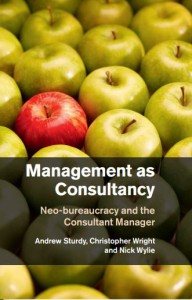
Professor Andrew Sturdy, Department of Management
We are all familiar with the popular image of management consultancy as part of a multi-billion dollar industry. Consultants are seen by many as being masters of the universe. And yet their future may be threatened by an increasing trend of managers adopting consultancy practices as their own.
Our recent research into the changing nature of managerial work details this internalisation of consulting. Management work is becoming less hierarchical (on the surface at least) and more market and change oriented – a sort of hybrid of both old fashioned bureaucracy and its post-modern or chaotic opposite.
Three routes
One way in which this change is happening is by adopting a model based explicitly on external management consultancy which we call “management as consultancy”. This is happening through three different routes.
Firstly, large organisations are recruiting former external management consultants into management positions, especially favouring those from ‘blue chip’ consulting firms. This is creating a new community or diaspora of former consultants and resulting in a particular approach to managing, using rigid change and project management tools for example.
Secondly, management groups within organisations such as those in information technology (IT), accounting and human resources (HR) are reinventing themselves as consultants. This was already the case with external accounting and IT firms who boosted their income through consulting services. But now the aim is to enhance the occupational status of specific managerial groups within organisations by borrowing from the prestige of external consultants. As one re-fashioned HR manager we interviewed claimed:
‘I’m not sitting behind a desk in an ivory tower, hidden … I’m very mobile, so if I need to be in another location, the car is under the building and I move, so I’m mobile and truly like a consultant.’
Of course, this can sometimes go wrong as there is stigma as well as status attached to the management consultant identity.
The third way in which management is internalising consulting is the extension of what were once termed “internal consulting units”. These have long represented the less fashionable side of consulting, although large organisations often found them effective. They are now re-branding themselves with titles such as “programme management” and “performance delivery”. They may still have a precarious existence though, subject to the whims of new CEOs or waves of job-cuts. As one such consultant manager pointed out: ‘we don’t actually have proper jobs. If they abolished us tomorrow, what would change?’ Despite such pessimism, these units can thrive for years. And even if they are cut, they often re-emerge in different parts of the organisation with a new name.
Impacts
Taken together, the result of these changes is an emerging group of “consultant managers” in large public and private sector organisations. This has important implications for the future of management and consultancy.
For example, if management groups like human resources take on a consulting identity, they risk becoming dispensable. Also, while some managers may appear more professional in such a role, they can lose accountability, much like external consultants. Can all managers then, become like consultants in their approach?
Although consulting can come in different forms (some of it resembles counselling more than management), we found that the model adopted tended to be at the harder end of the spectrum. It was focused on short term gains, on what businesses like to call “value add” and on using mechanistic tools such as those taught on many MBA programmes. In such a world, alternative approaches to organising, including those stressing longer term goals, employee participation and capability building, risk being marginalised.
The rise of the consultant manager also has implications for external management consultancy. This industry has become hugely successful, shaping business organisations and governments across the world. However, commentators have highlighted a range of disruptive threats to this business model, including “small armies of former consultants” being hired. Our research echoes this point but also highlights how management consulting is not so much a successful, elite profession, but a type of management. If the trend towards management as consultancy continues, then external consultancy risks both substitution and de-mystification. It would be as if the success of management consultancy has paradoxically led to the demise of the external consultant.
No doubt the consulting industry will respond to this and other threats, as it has in the past. It could focus more on projecting its expertise as a rare commodity and on its “outsider” role of rubber-stamping decisions. Whatever the outcome, management consultants should no longer be seen simply as influential outsiders, but as part of the management mainstream.
The book Management as Consultancy: Neo-bureaucracy and the Consultant Manager is launched today. For further information contact Andrew Sturdy.
Authors

Professor Andrew Sturdy, Head of Department of Management and Chair in Management at University of Bristol

Professor Chris Wright, Professor of Organisational Studies at University of Sydney

Dr Nick Wylie, Senior Lecturer at Oxford Brookes University

